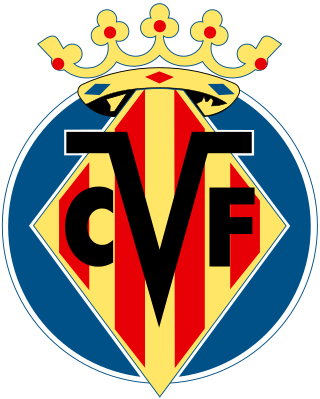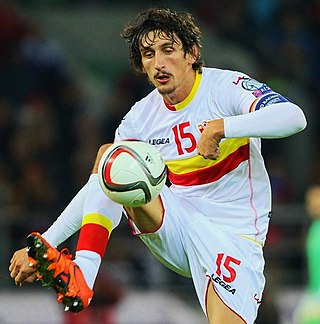
The EFL Cup, currently known as the Carabao Cup for sponsorship reasons, is an annual knockout competition in men's domestic football in England. Organised by the English Football League (EFL), it is open to any club within the top four levels of the English football league system – 92 clubs in total – comprising the top-level Premier League, and the three divisions of the English Football League's own league competition.

Manchester City Football Club are an English professional football club based in Manchester that competes in the Premier League, the top flight of English football. Founded in 1880 as St. Mark's , they became Ardwick Association Football Club in 1887 and Manchester City in 1894. The club's home ground is the City of Manchester Stadium in east Manchester, to which they moved in 2003, having played at Maine Road since 1923. Manchester City adopted their sky blue home shirts in 1894, in the first season with the current name. Over the course of its history, the club has won nine league titles, seven FA Cups, eight League Cups, six FA Community Shields, one UEFA Champions League, one European Cup Winners' Cup, and one UEFA Super Cup.

Rafael Benítez Maudes is a Spanish professional football manager and former player who manages La Liga club Celta Vigo.
The away goals rule is a method of tiebreaking in association football and other sports when teams play each other twice, once at each team's home ground. Under the away goals rule, if the total goals scored by each team are equal, the team that has scored more goals "away from home" wins. This is sometimes expressed by saying that away goals "count double" in the event of a tie, though in practice the team with more away goals is simply recorded as the victor, rather than having additional or 'double' goals added to their total.

Villarreal Club de Fútbol, S.A.D., usually abbreviated to Villarreal CF or simply Villarreal, is a Spanish professional football club based in Villarreal, in the Castellón province of eastern Spain, that plays in La Liga, the top flight of Spanish football.
The history of the European Cup and UEFA Champions League spans over sixty years of competition, finding winners and runners-up from all over the continent.

Liverpool Football Club is a professional association football club in Union of European Football Associations (UEFA) competitions. Since 1964, they have won fourteen European and Worldwide trophies, more than any other British club. These consist of the UEFA Champions League six times, the UEFA Europa League three times, the UEFA Super Cup four times, and the FIFA Club World Cup once.
With 48 continental trophies won, English football clubs are the third-most successful in European football, behind Italy (49) and Spain (65). In the top-tier UEFA Champions League, a record six English clubs have won a total of 15 titles and lost a further 11 finals, behind Spanish clubs with 19 and 11, respectively. In the second-tier UEFA Europa League, English clubs are also second, with nine victories and eight losses in the finals. In the former second-tier UEFA Cup Winners' Cup, English teams won a record eight tiles and had a further five finalists. In the non-UEFA organized Inter-Cities Fairs Cup, English clubs provided four winners and four runners-up, the second-most behind Spain with six and three, respectively. In the newly created third-tier UEFA Europa Conference League, English clubs have a joint-record one title so far. In the former fourth-tier UEFA Intertoto Cup, England won four titles and had a further final appearance, placing it fifth in the rankings, although English clubs were notorious for treating the tournament with disdain, either sending "B" squads or withdrawing from it altogether. In the one-off UEFA Super Cup, England has ten winners and ten runners-up, the second-most behind Spain with 16 and 15, respectively. Similarly to the Intertoto Cup, English teams did not take the former Intercontinental Cup seriously enough, despite its international status of the Club World Championship. They a made a total of six appearances in the one-off competition, winning only one of them, and withdrew a further three times. English club have won the FIFA-organized Club World Cup three times, the third-most behind Spain and Brazil, with eight and four, respectively.

The 2005–06 season was the 114th season in Liverpool Football Club's existence, and their 44th consecutive year in the top-flight, and covers the period from 1 July 2005 to 30 June 2006. Liverpool finished the season in third position, nine points behind champions Chelsea. They won the FA Cup for the seventh time by beating West Ham United in the final 3–1 on penalties after a 3–3 draw.

Stefan Savić is a Montenegrin professional footballer who plays for La Liga club Atlético Madrid and the Montenegro national team as a centre-back.

The 2009–10 season was Aston Villa's 135th professional season; their 99th season in the top-flight and their 22nd consecutive season in the top flight of English football, the Premier League. They were managed by Martin O'Neill – in his fourth season since replacing David O'Leary. The 2009–10 season was Villa's second consecutive spell in European competition for the club, and the first in the newly formatted UEFA Europa League.

The 2014–15 season was Liverpool Football Club's 123rd season in existence and their 53rd consecutive season in the top flight of English football. It was also the club's 23rd consecutive season in the Premier League. Along with the Premier League, Liverpool also competed in the FA Cup, Football League Cup and UEFA Champions League. Having finished third in their group, Liverpool subsequently dropped down to the UEFA Europa League.

The 2017–18 UEFA Champions League was the 63rd season of Europe's premier club football tournament organised by UEFA, and the 26th season since it was renamed from the European Champion Clubs' Cup to the UEFA Champions League.

The 2018–19 UEFA Champions League was the 64th season of Europe's premier club football tournament organised by UEFA, and the 27th season since it was renamed from the European Champion Clubs' Cup to the UEFA Champions League. For the first time, the video assistant referee (VAR) system was used in the competition from the round of 16 onward.

The 2021–22 UEFA Champions League was the 67th season of Europe's premier club football tournament organised by UEFA, and the 30th season since it was renamed from the European Champion Clubs' Cup to the UEFA Champions League.

The 2023–24 UEFA Champions League is the 69th season of Europe's premier club football tournament organised by UEFA, and the 32nd season since it was renamed from the European Champion Clubs' Cup to the UEFA Champions League.

The 2022–23 UEFA Champions League was the 68th season of Europe's premier club football tournament organised by UEFA, and the 31st season since it was renamed from the European Champion Clubs' Cup to the UEFA Champions League.

The 2021–22 season was the 120th season in the existence of Manchester City Football Club and their 20th consecutive season in the top flight of English football. In addition to the domestic league, Manchester City also participated in this season's editions of the FA Cup, EFL Cup, Community Shield and UEFA Champions League.

The 2021–22 season was Liverpool Football Club's 130th season in existence and their 60th consecutive season in the top flight of English football. During the season, Liverpool won the EFL Cup for the ninth time in their history, a tournament record, and later achieved a domestic cup double with a victory in the FA Cup for their eighth title. In spite of fixture congestion, Liverpool participated in every game they were eligible to play throughout the 2021–22 season, as they competed for both the Premier League and Champions League titles, ultimately finishing second in the Premier League, just a point behind Manchester City, and losing the Champions League final to Real Madrid 0–1.

The 2022–23 season was Liverpool Football Club's 131st season in existence and their 61st consecutive season in the top flight of English football. Coming off their 2021–22 campaign, Liverpool competed in this season's editions of the Premier League, FA Cup, EFL Cup and UEFA Champions League.
















